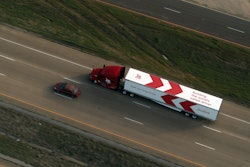Insuring a commercial fleet is a significant cost for any trucking operation and choosing the right insurance coverages and carrier can be a daunting task. And if it seems confusing, don’t worry. We’re here to help explain the factors used to calculate an insurance premium.
While some factors are out of your control, you may be able to better manage your insurance costs and optimize the return on your insurance investment by focusing on a few key factors that you can influence.
Prioritize and document your safety programs
Safety culture is a frequent topic of conversation. Maintaining a safe workplace not only improves morale but also has a direct impact on insurance costs. Loss history and driver motor vehicle records (MVRs) are calculated into trucking insurance premiums and can significantly impact costs. You can’t change your loss history, but you can show how your losses and driver experience are improving. Insurance companies often have underwriting factors available to increase or reduce rates for a business based on risk level. There are things you can do to show safety is a priority and make the case that you should be given the best rates. Some of those include:
Document your safety programs. Insurance companies can only reward you with lower premiums if you can show what you’re doing to maintain safety. Keeping clear and accurate documentation allows companies to see which programs you have implemented, if there has been progress and plans for future improvement. Some examples of things to document include training programs with attendance statistics, safety audits you’ve completed, driver training programs and disciplinary programs for unsafe behavior.
Work with risk management professionals. Your insurance company may have a loss control or risk management team focused on helping customers improve safety. Working with these safety professionals can help manage your costs by reducing your claims and loss experience factors while demonstrating your commitment to safety.
Choose the right coverage
Insurance can help protect your business in countless situations. From liability, damaged vehicles and workplace injuries to cyberattacks, lawsuits and lost time, there is no shortage of coverage you can purchase to safeguard your employees and operations. Choosing coverage wisely will help protect your business while ensuring you’re managing insurance costs.
Consider the cost of coverage versus a loss and whether your business can afford to absorb it. When choosing your deductible, you should make a similar calculation. A higher deductible will save you money on insurance premiums, but if an accident happens, it is critical that your business is able to afford the deductible cost.
Connect with an insurance expert
Deductible calculations and coverage decisions can be easier if you work with the right people. An independent insurance agent with experience in trucking can help you decide which coverages you need, what limits would be best and which deductible you should choose. An agent can help you present your business to insurance companies and advocate for you to receive the best rates.
When choosing an insurance provider, consider the following: What services do they provide? Do they have dedicated loss control resources to help with safety? How are their claims service ratings? Do they understand my business? Weigh the value of their services compared with the cost.
Your insurance company can provide value outside of just paying claims. And, when you file a claim, you should have confidence it will work to protect your business.
Managing insurance costs for your trucking business can be a balancing act, but taking the right measures can help ensure you’re protected and getting the best value for your coverage needs. Prioritizing and documenting safety programs, engaging with risk management professionals and selecting the right coverages are crucial. Working with an independent insurance agent who understands trucking is a great place to start.












